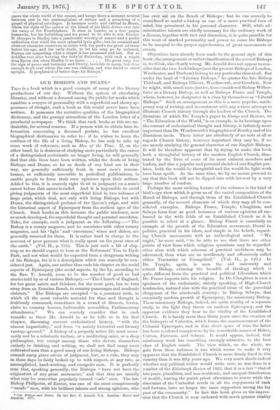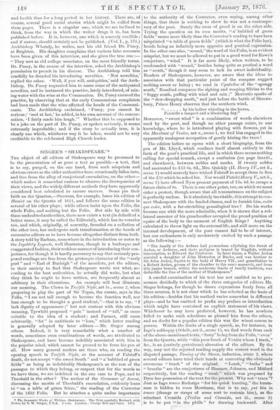OUR BISHOPS AND DEANS.* Tins is a book which is
a good example of many of the literary productions of our day. Without the system of circulating libraries, and without a demand among the public for works which combine a soupcon of personality with a superficial and showy ap- pearance of thought, such a book as this would never have been written. It possesses the narrative qualities of the biographical dictionary, and the gossipy attractions of the London letter of a provincial newspaper. We think that such books as this are un- desirable, for several reasons. If a person wish to obtain bare in- formation concerning a deceased prelate, he has excellent biographical dictionaries to refer to ; if he wishes to learn the outlines of the life of a living Bishop, he has only to take up some work of reference, such as Men of the Time. If, on the other band, he is desirous of studying more particularly the career of a distinguished ecclesiastic no longer living, he will generally find that able lives have been written, whilst the deeds of living Bishops and Deans, so far as deeds of any kind are in their way, are generally sufficiently fresh in most men's remem- brance, or sufficiently accessible in periodical publications, to enable people to form their own opinions upon their actions. Added to this, it is scarcely right Co sit in judgment on a man's career before that career is ended. And it is impossible to avoid giving judgments of the most superficial kind in two volumes of large print, which deal, not only with living Bishops, but with Deans, the distinguished prelates of the Queen's reign, and with the historical aspect of Episcopacy from the earliest ages of the Church. Such books as this increase the public tendency, now so much developed, for superficial thought and personal anecdotes. Take, for example, such a judgment as the following :—" The Bishop is a county magnate, and he associates with other county magnates, and his 'light' and 'sweetness,' wines and dishes, are generally reserved for them. It is rather hard to charge to the account of poor parsons what is really spent on the great ones of the earth." (Vo1 II., p. 105). This is just such a bit of clap- trap as we should expect to hear at the Reformers' Tree in Hyde Park, and not what would be expected from a clergyman writing of his Bishops, for it is a description which can scarcely be con- sidered just. Again, our author thus ends his chapter on the social aspects of Episcopacy (the social aspects, by the by, according to the Rev. F. Arnold, seem to be the number of good or bad stories told by or of various Bishops) :—" The Church of England, for her great saints and thinkers, for the most part, has to turn away from an Erastian Bench, to country parsonages and academic cloisters." The Bishops are occupied "in a „constant rush, in which all the most valuable material for time and thought is fruitlessly consumed, sometimes in a round of dinners, levees, visits to country houses, fashionable assemblies, Parliamentary attendances." We can scarcely consider that in such remarks as these Mr. Arnold is, as he tells us in his first chapter, discussing current ecclesiastical history, "with the utmost impartiality," and from "a mainly historical and literary vantage-ground." A bishop of a properly active life must neces- sarily not be a scholastie recluse, or a meditating saint, or a deep philosopher, but except among those who devote themselves entirely to thinking and writing, we shall not find many more cultivated men than a good many of our living Bishops. Bishops commit many grave errors of judgment, but, as a rule, they may in these days be fairly looked up to with respect, at any rate, as accomplished, hard-working, and energetic men. It is perfectly true that, speaking generally, the Bishops "have not been the originators of any great movement," and that they are usually What may be somewhat popularly termed "safe" men. The late Bishop Phillpotts, of Exeter, was one of the most conspicuously "unsafe" men, with his brilliant talents and strong opinions, who * Or Bishops and 'Deans. By the Hey. F. Arnold, B.A. London: Hurd and Blackett. 1875.
has ever sat on the Bench of Bishops ; but he can scarcely be considered so useful a bishop as one of a more practical turn of mind, less prominent in his personal character. Still, while ad- ministrative talents are chiefly necessary for the ordinary work of a diocese, together with tact and discretion, it is quite possible for this want of marked personality and power to cause the Bishops to be unequal to the proper apprehension of great movements or events.
Objections have already been made to the general style of this book; the arrangement or rather classification of the several Bishops is, we think, also clearly wrong. Mr. Arnold does not appear to con- sider that the two Archbishops (nor the present Bishops of London, Winchester, and Durham) belong to any particular class at all. But under the head of "Literary Bishops," he quotes the late Bishop Thirlwall, and Bishops Ellicott, Wordsworth, and Goodwin. Now he might, with much more justice, have considered Bishop Wilber- force as a literary Bishop, as well as Bishops Fraser and Temple, whom, however, he designates in a class by themselves as "Liberal Bishops."' Such an arrangement as this is a mere popular, catch- penny way of writing, and inconsistent wih any serious attempt to illustrate Church history through the leaders of the Church. The literature of which Dr. Temple's paper in Essays and Reviews, on "The Education of the World," is an example, in its bearings upon the current of ecclesiastical thought and history, is infinitely more important than Dr. Wordsworth's biographies of Bentley and of his illustrious uncle. These latter are absolutely of no note at all as regards Church history, however important they may be, if we are merely studying the general character of our English Bishops. It will be therefore apparent that by trying to make this book both a thoughtful history of the modern English Church, illus- trated by the lives of some of its most eminent members and leaders, and also a popular and personal sketch of our English pre- lates, both the would-be thoughtful and the would-be light work have been spoilt. At the same time, we by no means pretend to say that this book will not be dipped into with interest by a very large number of readers.
Perhaps the most striking feature of the volumes is the kind of bird's-eye view which.it gives us of the varied composition of the Bench of Bishops, and through them of the Established Church generally, of the several elements of which they may all be con- sidered examples. Bishops Fraser, Temple, Claughton, and Selwyn form four as good instances of various opinions all em- braced in the wide folds of an Established Church as it is possible to select at a glance. Bishop Fraser is essentially an example of the growth of the Education movement, liberal in polities, practical in his ideas, and simple in his beliefs, regard- ing Church movements with an untheological mind. "We ought," he once said, "to be able to see that there are other points of view from which religious questions may be regarded other aims with which schemes of practical usefulness may be advocated, than what are so invidiously and offensively called either Tractarian or Evangelical." (Vol. IL, p. 120.) In Dr. Temple, again, is seen the old university and school Bishop, evincing the breadth of theology which is quite different from the practical and political Liberalism which Dr. Fraser imports into his religion. In Dr. Cla.ughton is seen a specimen of the ecclesiastic, strictly speaking, of High-Church tendencies, imbued also with the practical ideas of the parochial clergyman of the nineteenth century ; in Bishop Selwyn, that essentially modern growth of Episcopacy, the missionary Bishop. These missionary Bishops, indeed, are quite worthy of a separate study, in the light they throw on modern Episcopacy, and the apparent evidence they bear to the vitality of the Established Church. It is barely more thau thirty years since the creation of the bishopric of Calcutta, which fonns the commencement of the Colonial Episcopate, and in that short space of time the latter has been rendered conspicuous by the remarkable names of Heber, Cotton, Patteson, and Selwyn. It would appear, indeed, that missionary work has something strongly attractive to the best class of English minds. The view which, on the whole, we gain from these volumes is one which seems to make it very apparent that the Established Church is more firmly fixed in this counts.), than it was fifty years ago. We very much doubt indeed whether any political writer would write now, as was done in a number of the Edinburgh Review of 1822, that it is a fact" that of late years, pluralities, and non-residence, and unequal distribution of wealth, leaving the parish priest oftentimes to starve while the sinecurist of the Cathedral revels in all the enjoyments of rank and fortune, have no longer the same supporters among the lay part of the community." In fact this book gives us the impres- sion that the Church is now endowed with much greater vitality
and health than for a long period in her history. There are, of course, several good social stories which might be culled from these pages. There is a singular one, which we arc inclined to think, from the way in which the writer drags it in, has been published before. It is, however, one which is scarcely credible ; and if untrue, should certainly not be published. (Vol. I., p. 173.) Archbishop W hately, he writes, met his old friend Dr. Pusey, at Brighton. His daughter complains that various false accounts have been given of this interview, and she gives the true one :— " They met as old college associates, on the most friendly terms. Dr. Pusey, in the course of the interview, asked the Archbishop's permission to preach in his diocese. The Archbishop told him candidly he dreaded his introducing novelties. 'Not novelties,' replied the other. Well, if you will, antiquities,' said the Arch- bishop. Dr. Pusey requested him to name some of the antiquated novelties, and he instanced the practice, lately introduced, of mix- ing water with the wine at the Communion. Dr. Pusey excused the practice, by observing that at the early Communions complaints had been made that the wine affected the heads of the Communi- cants. The Archbishop exclaimed, Pusey, you cannot be serious;' ' and at last,' he added, in his own account of the conver- sation, 'I fairly made him laugh." Whether this be supposed to be a joke on the part of Dr. Pusey, or spoken seriously, it seems extremely improbable ; and if the story be actually true, it is clearly one which, whichever way it be taken, would not be very creditable to the celebrated High .Church leader.







































 Previous page
Previous page